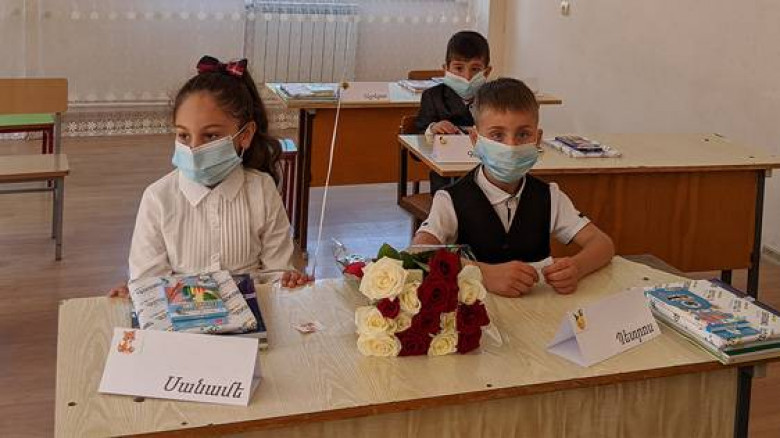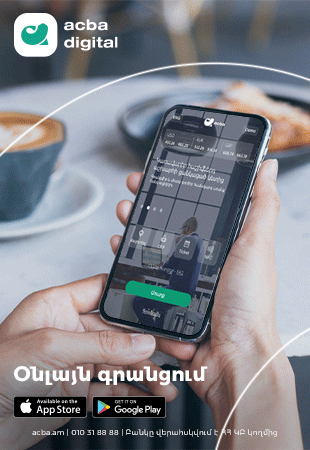Teach For Armenia and Ucom join forces to expand education opportunities
SOCIETY
Ucom has provided SIM-cards with mobile internet access as well as modems to the pupils of the basic school No. 2 in Dilijan, which is located in Takhta region to support their educational process. The school is one of the beneficiaries of “Seroond Schools” program by “Teach For Armenia” educational foundation.
"We are convinced that the potential of our communities is boundless, and the school is the key to discovering that potential, especially these days, when many families are experiencing a post-war tragedy, and there hangs a danger of pandemic. In this context, it is very important to introduce both existing and online tools so that our children have equal educational opportunities. We could not succeed in this work alone. We are very happy that our partner Ucom shares our vision, contributing to the education of our children, which, without any reservation, is a direct contribution to the future of our country," said Larisa Hovannisyan, Founder and CEO of Teach For Armenia.
“At Ucom we give importance to the accessibility of education through technology for all regions of Armenia. We have readily responded to the "Teach For Armenia" offer, as it is a reliable and our long-term partner organization. I am glad that during this academic year the pupils of Dilijan’s basic school number 2 have had the opportunity to benefit from the thousands of educational platforms and materials available on the internet, especially via the fastest mobile network in Armenia”, said Ara Khachatryan, Director General at Ucom.
It should be noted that "Seroond Schools" is a pilot program of innovative learning, which is implemented as a result of cooperation between the Ministry of Education, Science, Culture and Sport of the Republic of Armenia and the world network of “Kizazi" schools. It is a school that creates a new educational culture, which views education as an opportunity to develop students' cognitive, personal and social abilities. The activity of the school is based on the development of competencies. Moreover, today the number of students in this public school has doubled to about 80, despite its geographically problematic accessibility.

 Team Holding Announces the Launch of the Second Tranche of Its USD Bond Placement. Underwriter - Freedom Broker Armenia
Team Holding Announces the Launch of the Second Tranche of Its USD Bond Placement. Underwriter - Freedom Broker Armenia Ucom Services Can Now Be Paid Via Fast Shift
Ucom Services Can Now Be Paid Via Fast Shift
 Team and the French University in Armenia Help 120 Students Gain Real-World Experience
Team and the French University in Armenia Help 120 Students Gain Real-World Experience Ucom Offers Comprehensive Internal Network (LAN) Building Services for Corporate Clients
Ucom Offers Comprehensive Internal Network (LAN) Building Services for Corporate Clients
 Unibank Became an A-Level Member of the Armenia British Business Chamber
Unibank Became an A-Level Member of the Armenia British Business Chamber
 Winter adventures continue at Myler: Idram&IDBank
Winter adventures continue at Myler: Idram&IDBank With the Support of AraratBank, KardaLove 5th Anniversary Festival Returns in a New Format
With the Support of AraratBank, KardaLove 5th Anniversary Festival Returns in a New Format The Power of One Dram — to Mathemik NGO
The Power of One Dram — to Mathemik NGO IDBank’s Nor Nork branch has reopened
IDBank’s Nor Nork branch has reopened On the impossibility of making payments via Idram for telecommunication operators’ services and the current situation
On the impossibility of making payments via Idram for telecommunication operators’ services and the current situation When CSR Becomes a Driving Force for Business Development: Lala Bakhshetsyan
When CSR Becomes a Driving Force for Business Development: Lala Bakhshetsyan Five-Year Partnership Between AraratBank and 4090 Charity Foundation Comes to Successful Close
Five-Year Partnership Between AraratBank and 4090 Charity Foundation Comes to Successful Close
 Idram and Weixin Pay (WeChat Pay) Launch Strategic Partnership in Armenia
Idram and Weixin Pay (WeChat Pay) Launch Strategic Partnership in Armenia The Winners of the Third Round of the Junius Competition Have Been Announced
The Winners of the Third Round of the Junius Competition Have Been Announced What to gift men on January 28: Idram&IDBank
What to gift men on January 28: Idram&IDBank Idram Conducted a Financial Literacy Class for Roboton Participants
Idram Conducted a Financial Literacy Class for Roboton Participants Regarding Payments for Viva Armenia Services via Idram
Regarding Payments for Viva Armenia Services via Idram Vahe Hakobyan Is a Political Prisoner: Past.am
Vahe Hakobyan Is a Political Prisoner: Past.am Up to 2% Cashback with IDBank Mastercard and ARCA Card
Up to 2% Cashback with IDBank Mastercard and ARCA Card Up to 2% cashback, free Mastercard and free ArCa card when you join IDSalary
Up to 2% cashback, free Mastercard and free ArCa card when you join IDSalary AraratBank Sums Up “You Choose the Destination” Campaign Implemented in Partnership with Mastercard
AraratBank Sums Up “You Choose the Destination” Campaign Implemented in Partnership with Mastercard Book by March 31 and get 15% off your FINTECH360 ticket
Book by March 31 and get 15% off your FINTECH360 ticket
 Ucom Launches Fixed Network Services in Zovuni
Ucom Launches Fixed Network Services in Zovuni
 The FINTECH360 conference will be held in Yerevan from April 27 to 29
The FINTECH360 conference will be held in Yerevan from April 27 to 29
 AraratBank Partners as General Sponsor of 4090 Charity Foundation's Five-Year Milestone Event
AraratBank Partners as General Sponsor of 4090 Charity Foundation's Five-Year Milestone Event AraratBank Takes the Lead in Brand PR Performance
AraratBank Takes the Lead in Brand PR Performance  Unforgettable Moments and a Profitable Offer at Myler. Idram&IDBank
Unforgettable Moments and a Profitable Offer at Myler. Idram&IDBank
 Idram Summarizes 2025
Idram Summarizes 2025 The Power of One Dram Donates 5,788,105 AMD to the City of Smile Charity Foundation
The Power of One Dram Donates 5,788,105 AMD to the City of Smile Charity Foundation
 Converse Bank Successfully Completes Globbing Bond Placement
Converse Bank Successfully Completes Globbing Bond Placement
 Why the Pressure on Vahe Hakobyan Continues
Why the Pressure on Vahe Hakobyan Continues
 Ucom Introduces Hecttor AI to Improve Call Center Communications
Ucom Introduces Hecttor AI to Improve Call Center Communications
 The Armenian Apostolic Church: Refutation of a False Premise
The Armenian Apostolic Church: Refutation of a False Premise
 Vahe Hakobyan Is Being Politically Persecuted
Vahe Hakobyan Is Being Politically Persecuted Idram employees are the Secret Santa Claus for the students of the Orran Day Care Center
Idram employees are the Secret Santa Claus for the students of the Orran Day Care Center AraratBank Donates AMD 8 million to the Reconstruction of the Spandaryan Canal
AraratBank Donates AMD 8 million to the Reconstruction of the Spandaryan Canal Unibank Launches Gift Cards
Unibank Launches Gift Cards
 New Education Platforms through Cooperation between AraratBank and Aren Mehrabyan Foundation
New Education Platforms through Cooperation between AraratBank and Aren Mehrabyan Foundation Tech Innovator and Winemaker Adam Kablanian Joins the Board of Trustees of the “Music for Future” Foundation
Tech Innovator and Winemaker Adam Kablanian Joins the Board of Trustees of the “Music for Future” Foundation Ucom Reopens Sales and Service Center on Tigran Mets Avenue
Ucom Reopens Sales and Service Center on Tigran Mets Avenue  AraratBank Receives Visa Trusted Partnership Award 2025
AraratBank Receives Visa Trusted Partnership Award 2025  Secret Santa at idplus: Anonymous Gift Cards
Secret Santa at idplus: Anonymous Gift Cards We condemn the unlawful actions by Armenia’s Gov. against the Armenian Apostolic Church. Jan Figel
We condemn the unlawful actions by Armenia’s Gov. against the Armenian Apostolic Church. Jan Figel
 Free Style issues Armenia’s first corporate bonds in the fashion retail sector, placed by Cube Invest
Free Style issues Armenia’s first corporate bonds in the fashion retail sector, placed by Cube Invest Unibank Completed the Placement of Its Third Issuance of Perpetual Bonds
Unibank Completed the Placement of Its Third Issuance of Perpetual Bonds Scholarship for 100 Artsakh Students as Part of IDBank’s “Side by Side” Program
Scholarship for 100 Artsakh Students as Part of IDBank’s “Side by Side” Program
 The results of the second Junius financial literacy competition have been summarized
The results of the second Junius financial literacy competition have been summarized
 From idea to implementation: Ameriabank Presents the Programs Implemented under My Ameria, My Armenia CSR Campaign
From idea to implementation: Ameriabank Presents the Programs Implemented under My Ameria, My Armenia CSR Campaign
 Ucom and SunChild Launch the “Smart Birdwatching” Educational Program
Ucom and SunChild Launch the “Smart Birdwatching” Educational Program
 AraratBank Supports Digitization of "Karin" Scientific Center Archive
AraratBank Supports Digitization of "Karin" Scientific Center Archive 





